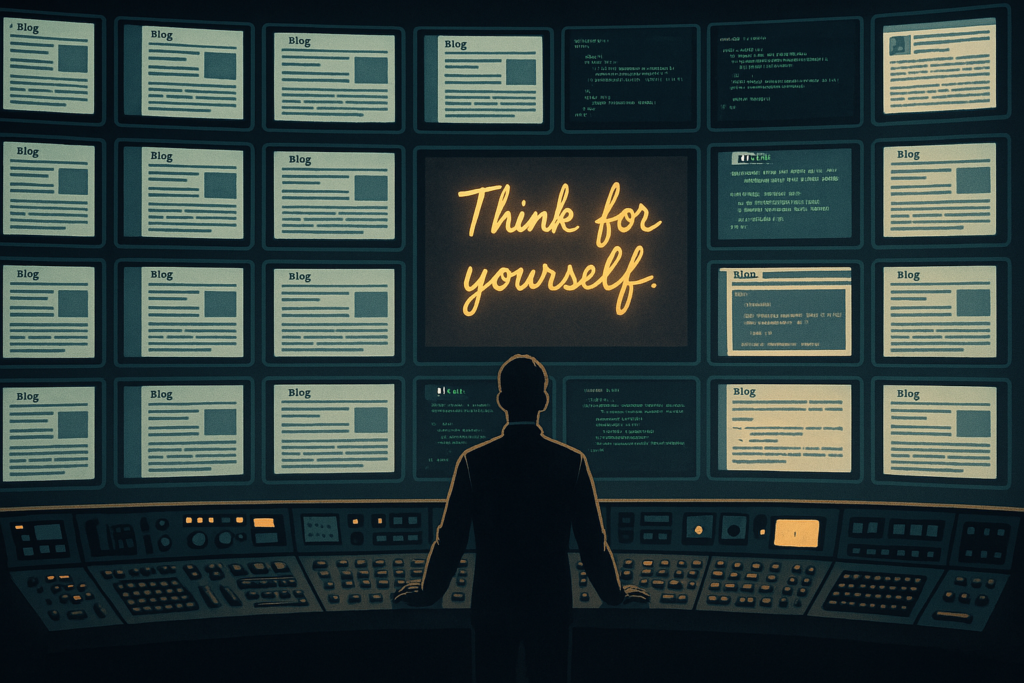
Introduction
We’re living in a golden age of SEO hype. Tools promise to generate entire blog posts in seconds, rank on page one by morning, and make you the next thought leader without a single original thought. Just drop a prompt, sprinkle in some keywords, and hit publish. Easy.
But here’s the uncomfortable truth:
AI-generated SEO content isn’t making the web smarter. It’s just making it louder.
And most of that noise? Completely forgettable.
As someone who’s been in the trenches building multiple blogs, I’ve seen how hard it is to earn Google’s trust. I’ve battled crawling issues, broken indexing, and spam-tier content getting prioritized over original insights. Still, I show up. Still, I write. Still, I build.
1. The Rise of AI SEO: From Promise to Pollution
AI SEO tools didn’t start as the enemy. They started as helpers—tools designed to speed up content workflows, assist with keyword research, and reduce the overhead of repetitive tasks.
However, what began as an assistive layer quickly became a shortcut factory. Once the market realized it could mass-produce blog posts that “looked” optimized, the floodgates opened. SEO wasn’t about content anymore—it was about volume.
What these tools churn out now isn’t content—it’s pollution. Generic, over-polished, prompt-engineered paragraphs with no voice, no soul, and no lasting value.
The tools didn’t fail. We failed in how we used them.
2. What We Lost Along the Way
There was a time when writing online was about transferring real knowledge. Breaking down complex ideas. Sharing a hard-earned lesson from the field. That era is dying.
Writers second-guess themselves because their real voice doesn’t sound “SEO-optimized.” Thoughtful ideas get buried under AI-generated noise. Furthermore, entire content ecosystems are now built around what ranks—not what matters.
AI can simulate structure. It can’t simulate struggle. And that’s where the best content comes from.
When everyone uses the same data pool, we get the same regurgitated answers. It’s not just SEO noise—it’s intellectual inbreeding.
Most of my topics don’t come from trending keyword lists or some SaaS dashboard. They come from my lived experience. The things that worked. The mistakes that hurt. The mindset shifts that happened somewhere between success and burnout. If I can’t vouch for it, I don’t write it.
3. Keyword Karaoke: Why Fast Rankings Don’t Last
Sure, you might rank fast. Especially with long-tail keywords or low-competition phrases. But if everyone’s using AI to do the same thing, your content has a half-life measured in days.
What starts as “topical authority” quickly becomes topical fatigue. And when Google updates hit (and they will), your AI-generated empire gets wiped out like a cookie-cutter MFA site.
You don’t want fast rankings. You want earned relevance.
I use tools like ChatGPT and Claude—not to write for me, but to help me dig faster, clarify ideas, or research a rabbit hole I’m exploring. That said, the actual voice, the reasoning, the message—it’s mine. Stored in memory. Sharpened by failure. Filtered by belief.
And yeah, I proofread every article we draft. If something feels off or unconvincing, I either revise it or delete it. The blog is a reflection of me, not the machine.
I’ve done all that—and still get forgotten by Google. I built structured long-form posts, optimized metadata, submitted sitemaps, added internal links, implemented proper schema, and wrote articles that were AI-generated, human-approved — edited with clarity, voice, and verified accuracy. But even that isn’t enough when the system prioritizes noise, favors high-authority domains, or just silently buries independent creators. Maybe it’s not just us. Maybe it’s time Google checks its own system too.
4. AI Is a Tool — But You’re the Operator
AI is not your replacement. It’s not your co-founder. It’s not your brand voice.
It’s a tool. A bridge. Nothing more.
Used correctly by someone with context, clarity, and lived experience—it’s powerful. Like handing a battle-hardened soldier the right weapon. They know what to do with it because they’ve seen enough, failed enough, and survived enough to make the shot count.
But hand that same weapon to someone who’s never fired anything before? You just automated the risk.
I use AI daily—but only as a research assistant, a brainstorm partner, a way to refine what I already think. I don’t ask it to replace my judgment. I ask it to pressure test it.
Most people using AI today don’t need more tools. They need more time thinking with the tools they already have.
5. SEO + AI: The Worst Combo When Misused
Here’s the real danger: SEO is already mechanical. Add AI to the mix, and you’re automating something that was already soulless when misapplied. When SEO becomes a checkbox-driven process, and AI turns that into a factory, you’ve essentially killed any chance of meaningful search.
It’s not that AI and SEO can’t work together—it’s that most people use them together to scale garbage faster.
Instead of creating value, they’re mass-producing mediocre. And the more the web fills with this kind of content, the harder it becomes for truly useful information to surface.
We’re not optimizing for users. We’re not even optimizing for search engines. We’re just flooding them.
6. And Yes, I Know This Firsthand
I’ve written about this before—how SEO in 2024 has become a pay-to-win system, where Google gives visibility to those with ad budgets, not necessarily those with the best content.
In AI + WordPress SEO Fail, I walked through how even with optimized plugins and clean structure, some of my best articles still never ranked—because authority signals and indexing quirks beat actual content.
In Passion Economy Failure, I broke down how the myth of “just write and they will come” is dead. Content alone isn’t enough. Visibility is bought. SEO is rigged unless you game the system—or build your own.
So if you’re wondering where the solution is—I’ll be blunt: I’m still figuring it out myself.
This entire post? It isn’t a manual. It’s a warning.
This process is ongoing. I haven’t scratched the surface of what SEO could look like if done right with AI. Still, I’m damn sure it’s not what most people are doing now.
We can get smarter. We can write better. We can think deeper. But only if we stop letting machines run the creative process end to end.
We don’t need a Skynet. We can’t make that same mistake—handing over thinking, creativity, and responsibility to machines without understanding the cost. Corny or not, we’ve seen enough fiction to know how it ends when systems evolve faster than the people wielding them.
Conclusion
AI will help you rank. No doubt. But if you let it replace your thinking, your content becomes noise.
And the web doesn’t need more of that.
Write slower. Think harder. Say something real.
Because in the long game, the best signal always cuts through.



Pingback: LLM Optimization Guide: Make Your Business Discoverable by AI
Pingback: LLM Optimization Guide: Make Your Business Discoverable by AI
Pingback: You Donu2019t Need AI to Rank u2014 You Need Clarity, Context, and Guts - Engineered AI
Pingback: AI Fatigue Is Real: Why Youu2019re Accepting Bad Output and Calling It Productivity